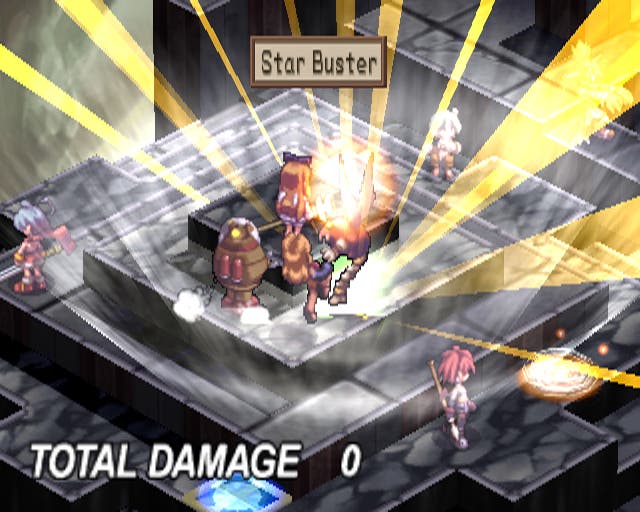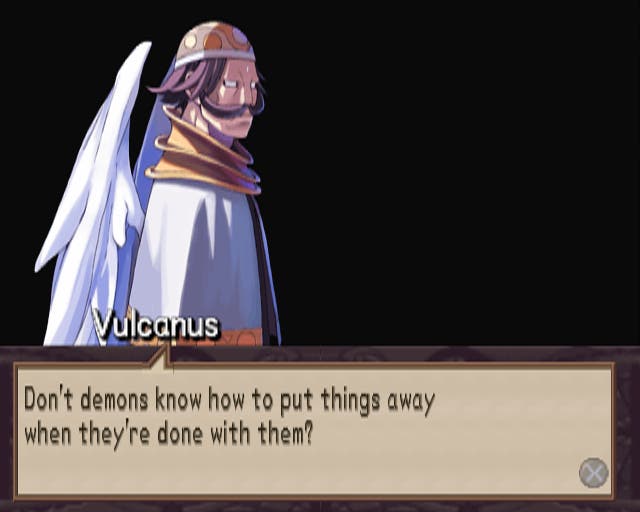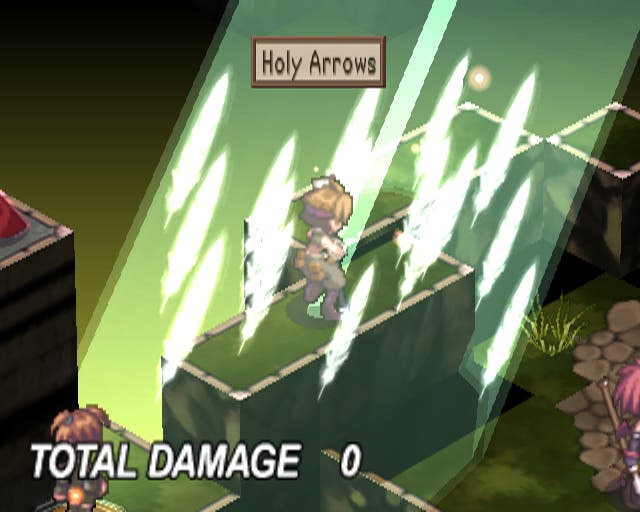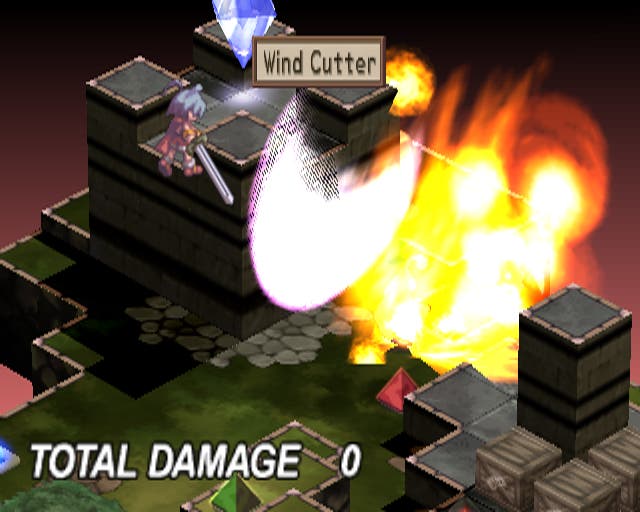Disgaea: Hour of Darkness
Another brilliant turn-based strategy-RPG. What the hell is going on lately?
Shop for games now with Simply Games.
A Japanese turn-based role-playing strategy title. Sounds like a barrel of laughs, right? Real material to make Billy Connolly, Denis Leary and Bill Bailey start watching their backs. No? We didn't think so either, to be honest. Turn-based strategy has never been a genre to have them rolling in the aisles, after all - in fact, it's rarely been a genre that publishers saw fit to release in Europe at all, with the notable exception of GBA classics Advance Wars, Final Fantasy Tactics Advance and, more recently, Fire Emblem.
Disgaea: Hour of Darkness, however, is funny as hell. Literally, given the setting of the game - which takes place in the demonic Netherworld, an evil realm packed to the gills with bizarre-looking, unpleasant, egotistical and self-serving creatures, a bit like Hoxton Square on a Friday night. The game one that'll elicit more laughs than any game with words like "turn-based" and "role-playing" in the description has a right to - not just because of the genuinely funny plot and dialogue, but because this is a game which constantly encourages you to be so deliciously evil, underhanded and downright mean that it's impossible to resist a cackle of triumph when your plans come together.
Prince of Evil

Okay, first off, to set the scene: you are Laharl, egotistical and obnoxious son of the king of the Netherworld. Unfortunately, being lazy, you've managed to sleep right through the death of the king, and for two years afterwards to boot, until you're awoken by your (incredibly violent) vassal Etna, who informs you of the fact that many demon lords have risen up and are vying for power in the Netherworld in the absence of the king. Since you're not only egotistical and obnoxious, but also a Prince of the Netherworld, you decide that it's obvious who should be in charge, and set forth from your castle to restore the rightful demon (you) to the throne by means of the traditional "beat the crap out of everyone who disagrees with you" method.
The game goes on to introduce a genuinely funny cast of demonic (and somewhat inept angelic) characters, and the dialogue between them - friend and foe alike - is one of the high points not just of this game, but of just about any in-game dialogue we've seen in quite a long time, packed as it is with tongue-in-cheek self-referential moments and sly sideswipes at just about every aspect of the whole religious mythos surrounding angels and demons, not to mention a stack of digs at popular Japanese culture. Suffice it to say that despite the general reputation of turn-based strategy RPGs for being somewhat light in the plot department (the seminal Final Fantasy Tactics being an obvious exception), Disgaea puts up an entertaining and involving plot that will satisfy the funny bone of just about any fan of Japanese RPGs.
In terms of the aforementioned policy of beating the crap out of everyone who disagrees with you, the game presents a fairly linear progression through a set of levels. Each one is a 3D map, presented in a rotating isometric view and divided up into a set of squares. You position your forces on the map and proceed to move them around in a turn-based manner, using a variety of ranged and melee attacks and magical powers to decimate your enemy. It's a system which will be familiar to anyone who's played Final Fantasy Tactics, Fire Emblem or the likes - although Disgaea does add its own unique touches to the gameplay.
Gang up on the little guy

For one, there's no initiative to worry about; your characters all take their moves in one massive turn, followed by your enemies also moving as a group. Whether you like this or not is a matter of personal opinion, really. We enjoyed the ability to set up complex group attacks without worrying about an enemy turn interrupting them, though, and overall would say that this was the right choice for the game. Another major new element which the game has added is a team attack system. When you perform an attack on an enemy, if an ally is standing next to you at the time there's a chance that they may perform a combo attack - effectively attacking the enemy for free as part of your turn. Manoeuvring your forces around so as to improve your chances of getting these attacks is a key tactic in the game.
Special map squares are a factor which Disgaea makes a fine art out of, too. Each map is patterned with differently coloured squares, and at certain points special crystals are placed on these squares which give special attributes to all squares of the same colour. These attributes can range from invulnerability to random teleporting to giving characters certain buffs such as the ability to attack twice in one round; and they can generally be turned off by attacking and destroying the crystals which confer the effects. However, doing so can also be used to kick off a chain reaction which damages enemies and hands you a whopping experience bonus. Learning to manipulate the special squares is one of the most important tactics in the game, and it's one which is - in our experience - quite unique to Disgaea.
Then there's the throwing. Disgaea isn't a game which gives more than a perfunctory nod to any sense of reality at the best of times, but when a key tactic in your strategy title involves having your characters pick up both enemies and allies and throw them around the map, you know you've pretty much left all sense of sanity at the door. Throwing allies is an important way to access certain areas of the map or to launch quick attacks at your foes; throwing enemies, among other things, allows you to merge two enemies (by chucking them onto the same square) to create a higher level enemy, which can be useful for levelling up your characters.
On the Level

Ah, levelling up. The phrase will make some of the less hardcore RPG fans out there wince, but you shouldn't. Disgaea is all about levelling up your characters - the game allows you to build up your statistics to a truly ridiculous level if you so desire - and the game has plenty of fantastic quirks and mechanisms which allow you to build the level and abilities of your characters on your quest to create an unstoppable army of evil. For example, you can include a low-level character in a combo attack which destroys a much higher level enemy, and he'll gain a spectacular amount of XP; or you can create a new character under the tutelage of an existing character, and the existing character will gradually learn to use the class abilities of the new one.
In this game, you can even level up your items - and in fact, that Item World feature is one of the most engrossing aspects of the game. Each item in the game has an entire "world" inside it, which you can enter from your castle and do battle in. The Item World consists of a set of increasingly difficult battlefields, and you can increase the stats of the item by defeating them (and escaping alive), which also serves as an excellent way to level up your characters if the main progression of the game becomes too difficult. Battlefields in the Item World are randomly generated and can get ferociously difficult - giving the game an impressive degree of longevity, even aside from the fact that it's possible to plough literally hundreds of hours into the other aspects of the gameplay if you so desire.
Since we mentioned creating new characters earlier, that deserves some explanation as well. While a large number of your characters in the game will be pre-existing plot-related characters, the remainder are created by you to fill gaps in your forces. You spend mana points, earned in combat, to create new characters - and later in the game the basic character classes will be expanded to allow you to create more advanced classes such as ninjas and knights as well as the basic mages, clerics, fighters and so on. You can also move existing characters from one class to another, which retains many of the abilities of the earlier class and effectively allows you to create super powerful characters by learning abilities from many different classes.
Don't Play Fair

If you're thinking that that sounds a bit unbalancing... Well, you're right. The game does always manage to keep throwing up new challenges, but in effect, this is a unique game where the whole point is to try and find unfair, underhanded advantages. The combo system is a perfect example; ganging up characters is hardly a fair fight, after all. The special square system can be used to gain a sneaky levelling advantage by sitting on invulnerable squares and attacking enemies far above your level. And the ability to transmigrate characters between jobs can create characters whose presence on the battlefield is, frankly, a completely unbalancing factor.
In any other game, these things would be bugs. In Disgaea, they're wilful and deliberate, and they form a core part of what it is that makes this game so special. You're actively encouraged to be evil and underhanded. Even when it comes to sending motions through the senate in your castle (an interesting game mechanic which can be used to unlock more powerful character classes or items), you're given a list of senators and their opinions and can try and bribe those opposed to you with items... Or, if you're feeling powerful enough, hit Persuade By Force to beat the senate into submission and make them do what you want. Larharl has been taking lessons from Blair, we suspect.
And this, more than the game's great sense of humour, is why you'll spend most of your time playing Disgaea cackling like a low-rent Bond villain. Every map has new opportunities to be evil and sneaky; every new game mechanic that unfolds in front of you brings with it a dazzling array of possible ways to tip the balance of the game unfairly towards you. It's a triumph of game design that the creators of the game seem to have thought of all these mechanisms and allowed for them in the difficulty curve of the levels, while still allowing you to feel that you're being supremely cunning; and equally, that you'll still feel that urge to laugh maniacally when a perfectly executed combo works out even after tens of hours of playing the game.
Army of Darkness
It's a shame, then, that Disgaea really isn't for everyone. Its colourful, anime-style artwork will put a lot of people off. Turn-based gameplay will put a lot of people off. The mention of strategy will have others running screaming for the hills. Indeed, if there was ever a game that defined the concept of a niche title, Disgaea would be it - and for that alone, and the sheer inaccessibility of the title to players new to the genre, we can't give this game a ten, much as it deserves it in almost every other way.
However, Disgaea is more than just "good if you like that sort of thing" - it's one of the best titles the PS2 has seen to date, and although its strength lies in depth, longevity and gameplay rather than in artistry and atmosphere, it still deserves to stand shoulder to shoulder with ICO in the rankings of "the best games you've never played". Even if turn-based strategy isn't your thing, Disgaea is a game you should at least try out; as the pinnacle of the genre, post-Final Fantasy Tactics, and as possibly the most engrossing videogame you'll ever play.
Shop for games now with Simply Games.








